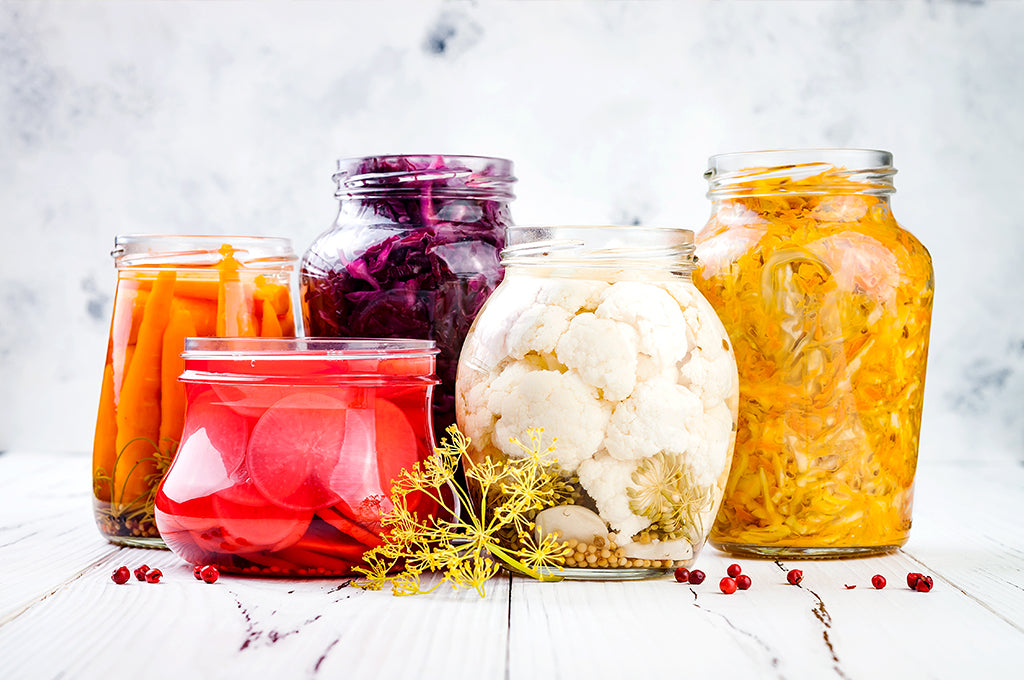Prebiotics and Probiotics Explained
4th September 2018 / Health
Prebiotics and Probiotics Explained
Laura Tilt

Pre And Probiotics Explained
If you’re interested in gut health, you’ve probably heard the words pre and probiotics – but what do they mean, and why do they matter to our digestive wellbeing?
To make sense of prebiotics and probiotics, we first need to take a journey into your gut. Stretching almost 8 metres in length, your gut is home to an impressive 40 trillion (or so) bacteria. Together with the genes they instruct, these bacteria are collectively known as your microbiome.
The work of your gut bacteria
You probably don’t spend much time thinking about the families of bacteria living in your gut, but behind the scenes these little guys are busy protecting your health.
One of the most important jobs of your gut bacteria is defending against illness. Helpful bacteria lining your gut form a physical barrier, stopping harmful bacteria from invading your inner world. They also turn the fibre you eat into anti-inflammatory compounds, and manufacture B vitamins, which turn food into energy.
Although your microbiome is fairly stable, it’s not immune to changes. Diet and exercise habits, antibiotic use and even stress levels can all affect the number and types of bacteria in your gut.
This is significant because changes in the microbiome seem to affect the risk of developing different diseases1. For example, changes in gut bacteria may be a trigger for IBS (irritable bowel syndrome), which can lead to symptoms like gas, bloating and tummy pain.
One thing is clear - taking care of your gut bacteria is important – and this is where pre and probiotics can play a role.
The role of probiotics and prebiotics
Probiotics are types of live bacteria – similar to the ones already living our guts. If consumed in sufficient numbers, they can benefit our health. They can help when our own gut bacteria are under pressure – when travelling, because of a poor diet, or due to antibiotic use. Probiotics can be consumed in foods (like yoghurt and cheese) or supplements, which contain various strains and doses of helpful bacteria.
Prebiotics aren’t live bacteria – they’re ingredients which feed your resident bacteria, encouraging them to multiply2. Prebiotics are mostly types of dietary fibre – they can be found in various foods (like onions, garlic, leek and oats) or taken as a supplement.
Both pre and probiotics are important because they have different effects on the gut. As probiotics pass through your digestive system, they interact with various cells, triggering helpful changes. However, they don’t necessarily increase the numbers of good bacteria on a long-term basis. This is the job of prebiotics, which encourage growth by providing food for the bacteria.
When consumed together, pre and probiotics have what we call a ‘symbiotic’ effect – they work together to balance the bacteria in your gut. Choosing to include both pre and probiotics in your diet is therefore a helpful move towards maintaining a beneficial balance in your gut’s flourishing garden.
References
- Enck P, Mazurak N. Dysbiosis in Functional Bowel Disorders. Ann. Nutr. Metab. 2018:296-306. doi:10.1159/000488773.
- Sanders ME, Merenstein D, Merrifield CA, Hutkins R. Probiotics for human use. Nutr. Bull. 2018;43(3):212-225. doi:10.1111/nbu.12334.
Link Nutrition's Synbiotic 7 contains both a prebiotic and 7 probiotic strands.
From The Blog
-

25th February 2025 / Health
Empowering Women’s Health: Key Supplements for Well-being
Women’s health is a lifelong journey, with each stage presenting unique nutritional and wellness needs. From maintaining energy levels to supporting hormonal balance and bone health, the right comb...
Read article -

17th February 2025 / Health
Empowering Women’s Health: Lifestyle Tips and a Key Supplement for Perimenopause and Menopause
NaomiWomen’s health evolves through various life stages, and the transition into perimenopause and menopause brings unique challenges. During these phases, hormonal fluctuations can lead to symptom...
Read article -

10th February 2025 / Health / Products
The Best Foods and Drinks to Help Your Body Recover from Burnout
Burnout is a growing issue in today’s fast-paced work culture, leaving many people feeling exhausted, overwhelmed, and depleted. While rest and self-care are essential, nutrition plays a crucial ro...
Read article




